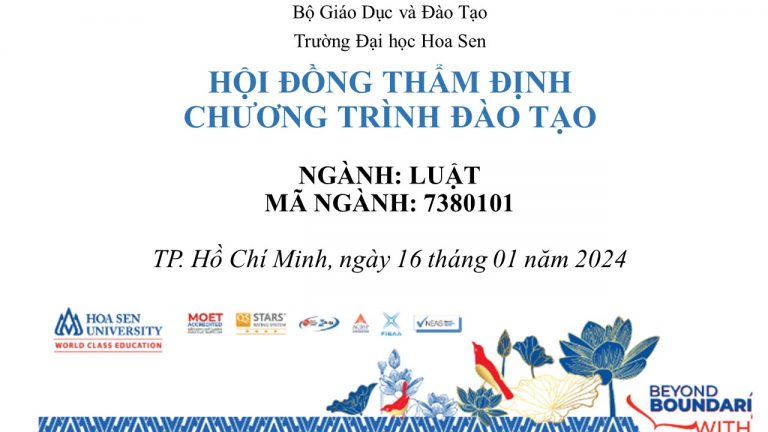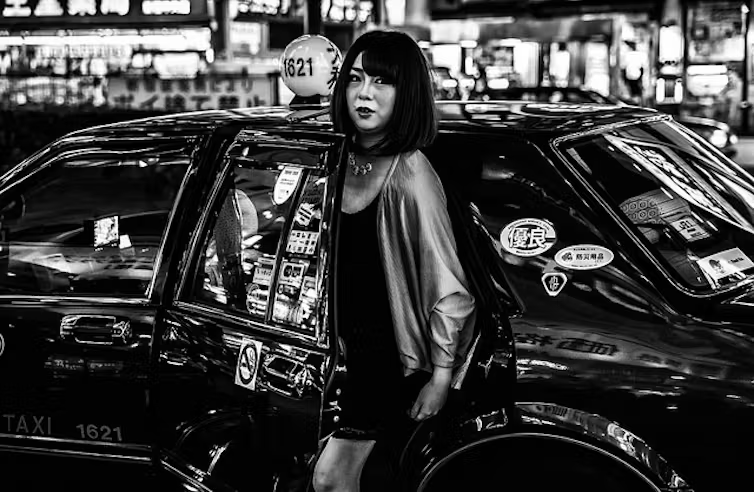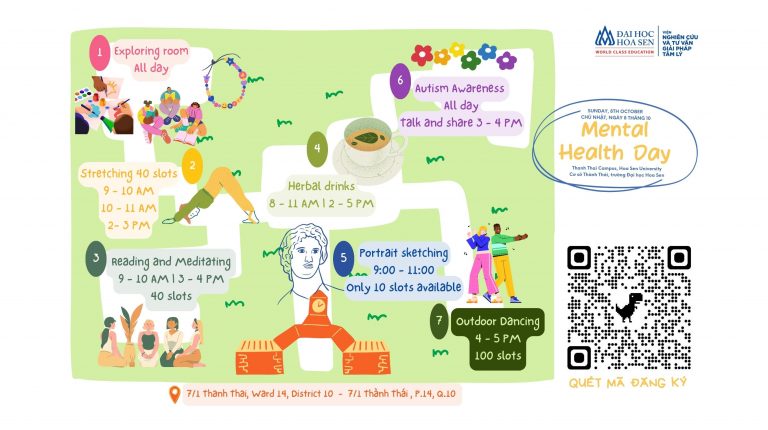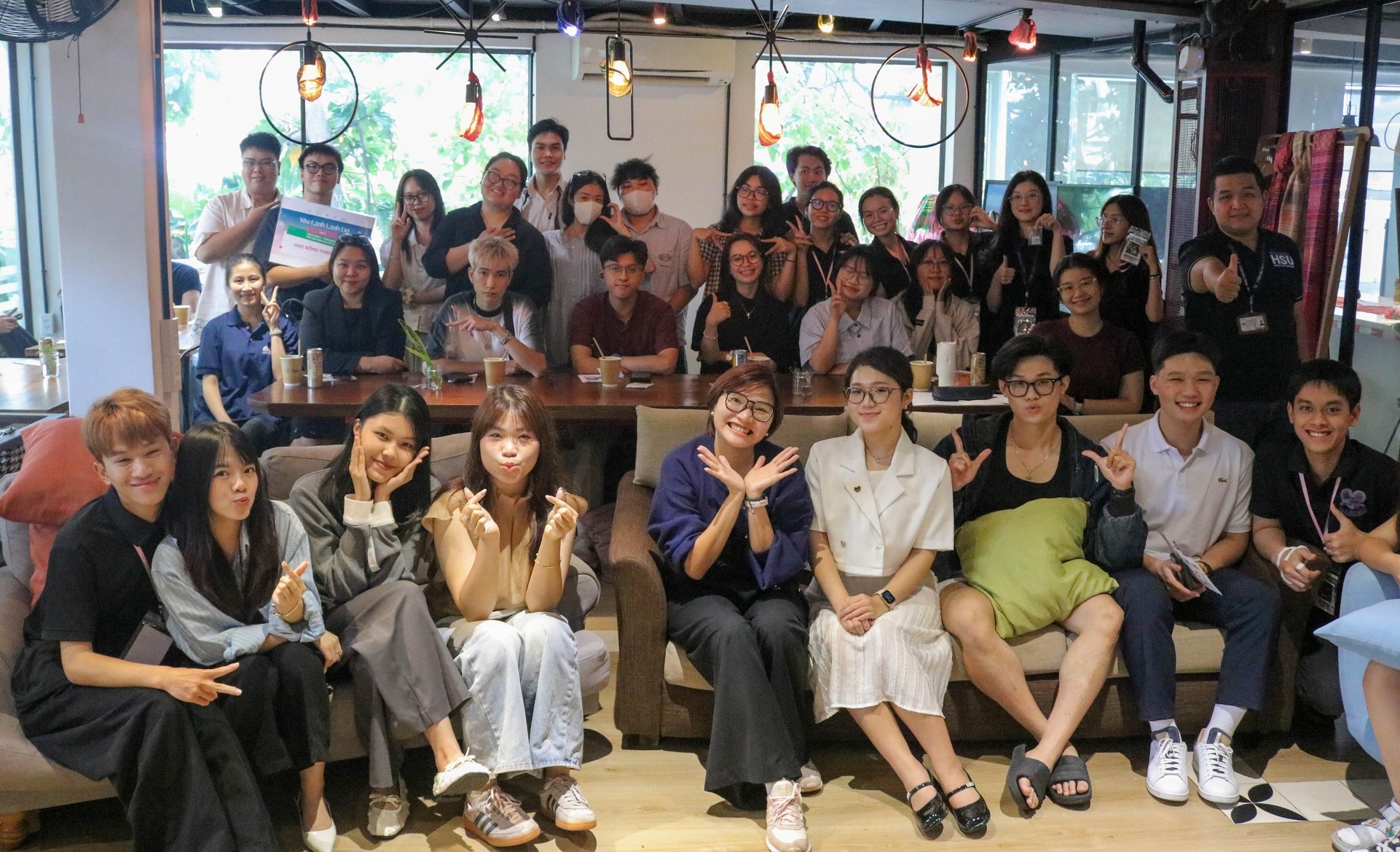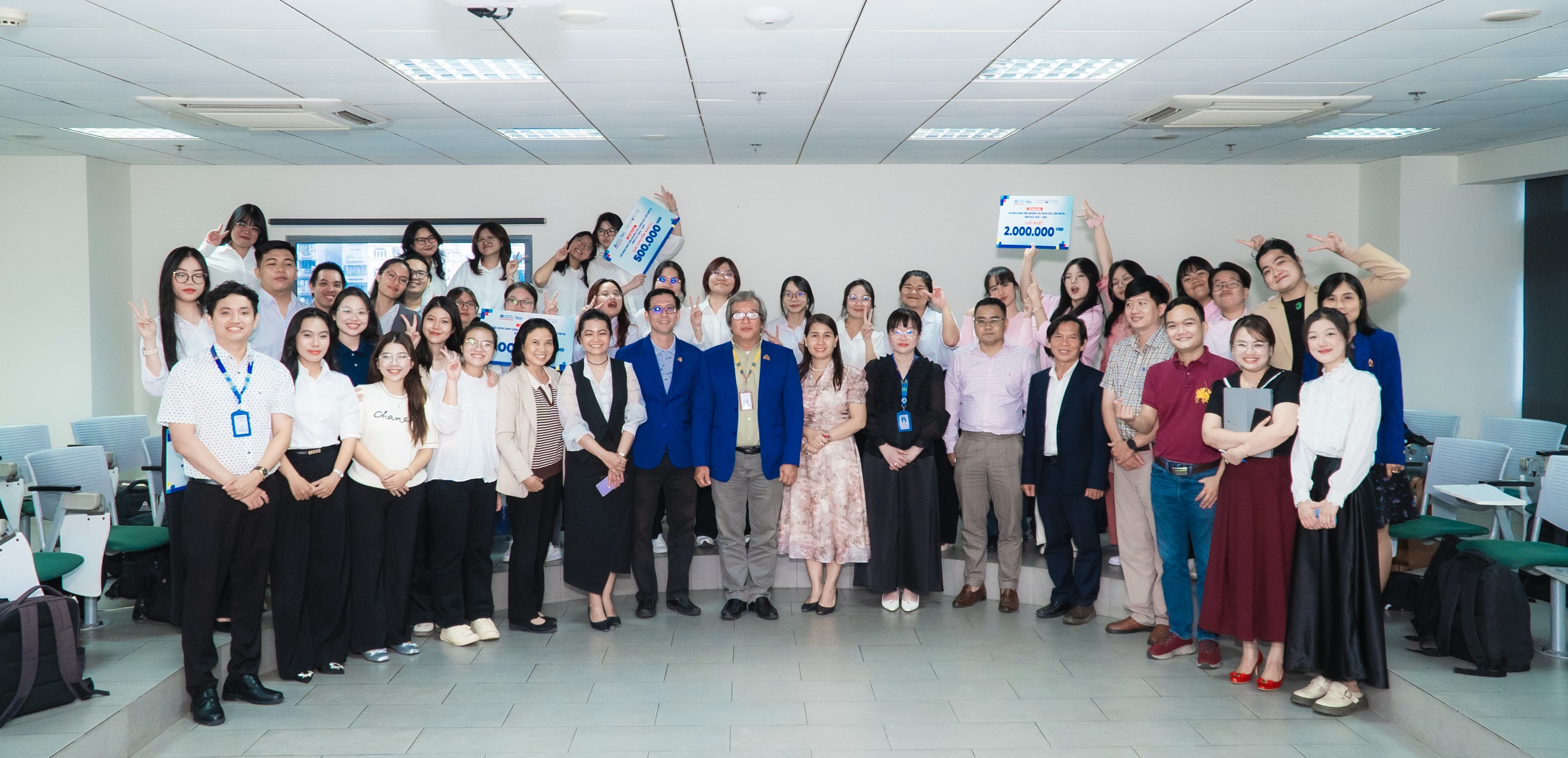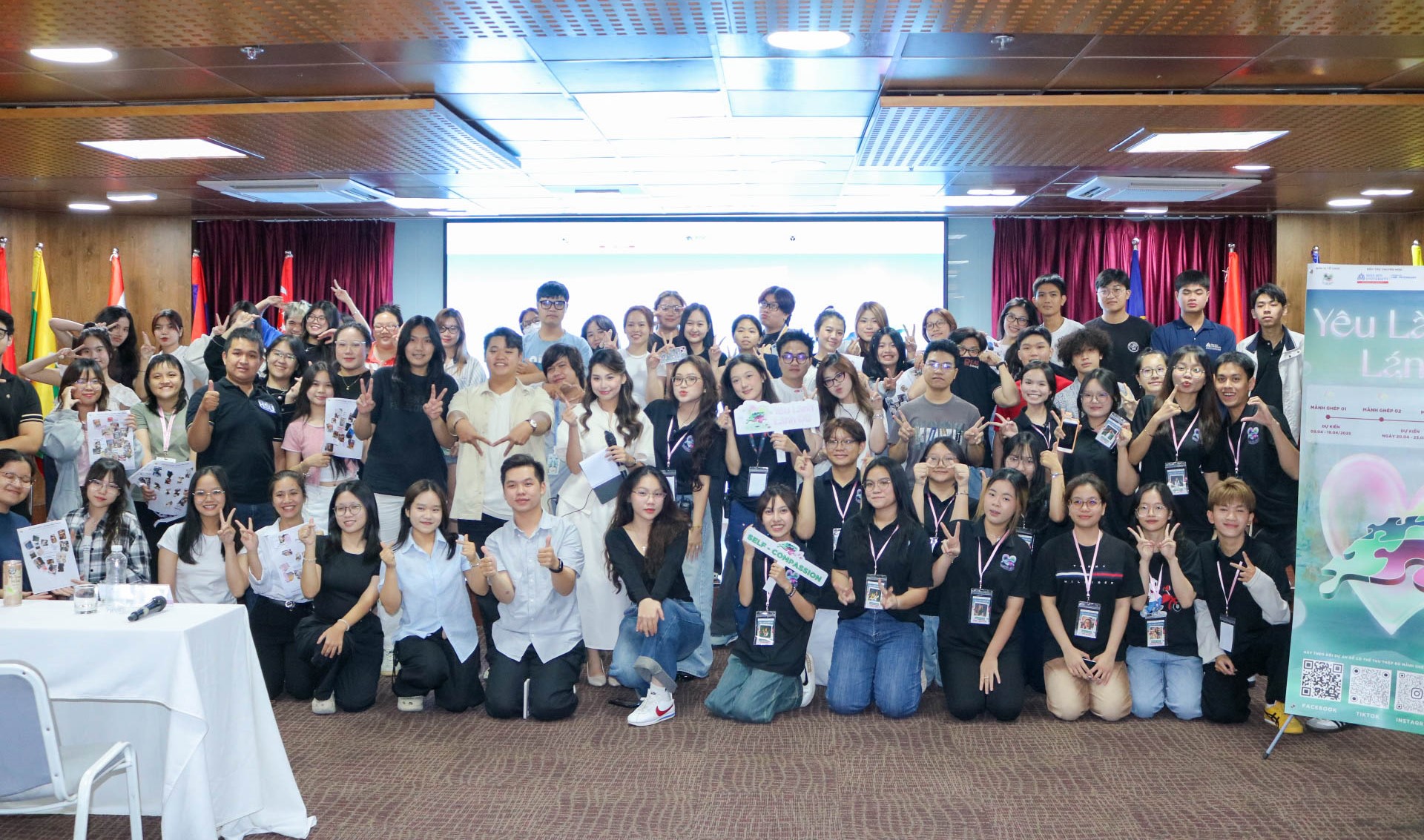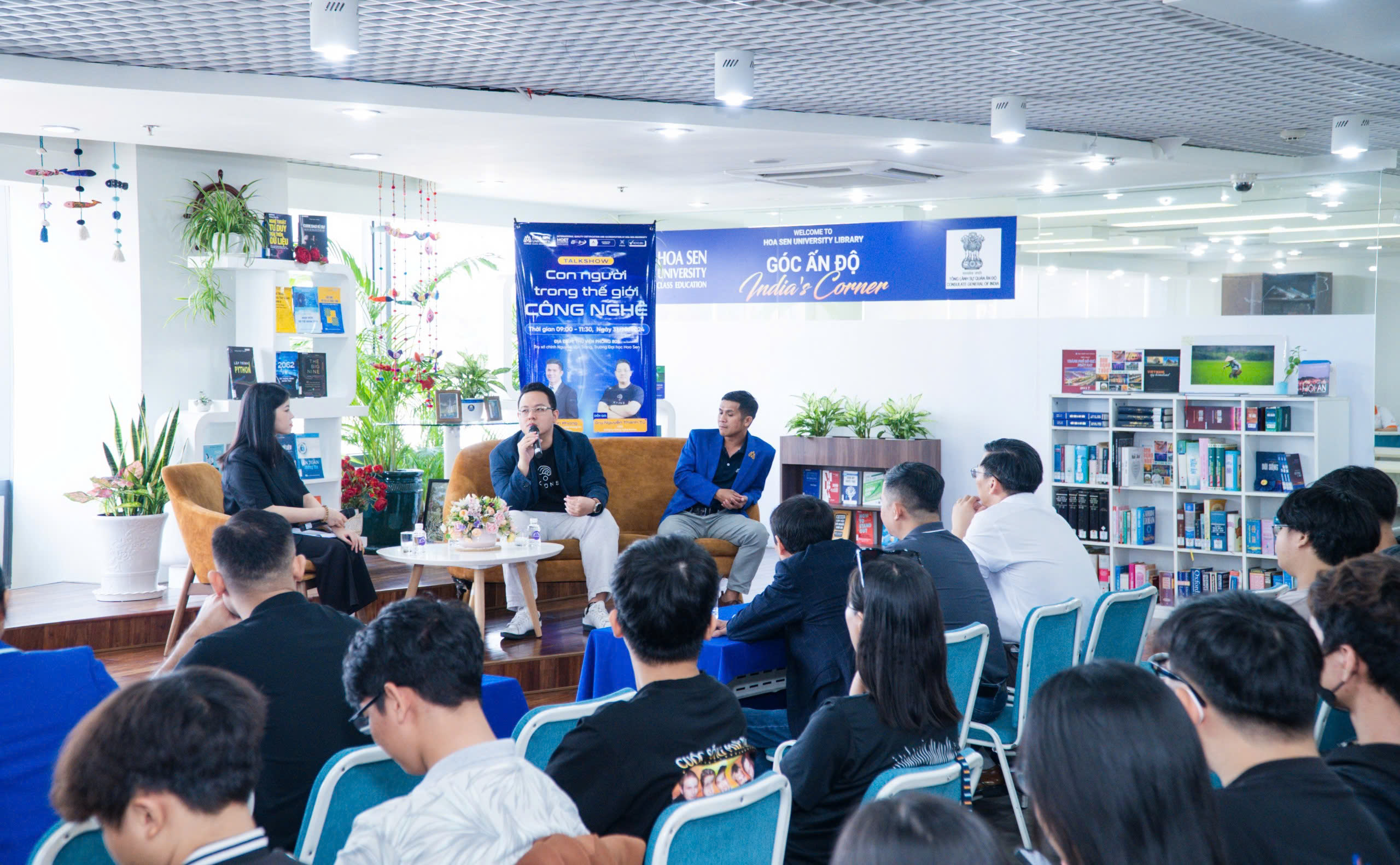Gender Talk #8: The phenomenon of Vietnamese Brides in Taiwan and in Korea
August 15, 2021
On April 29, 2021, Hoa Sen University organized a seminar on gender and gender equality – Gender Talk #8 with the topic: “The Status of Vietnamese Brides in Taiwan and in Korea.”
Opening topic 1: “Vietnamese brides in Korea”, Dr. Nguyen Thi Phuong Thao presented three main contents: Overview of Vietnamese – Korean marriage situation, social status of Korean women and, status of Vietnamese brides in Korea.
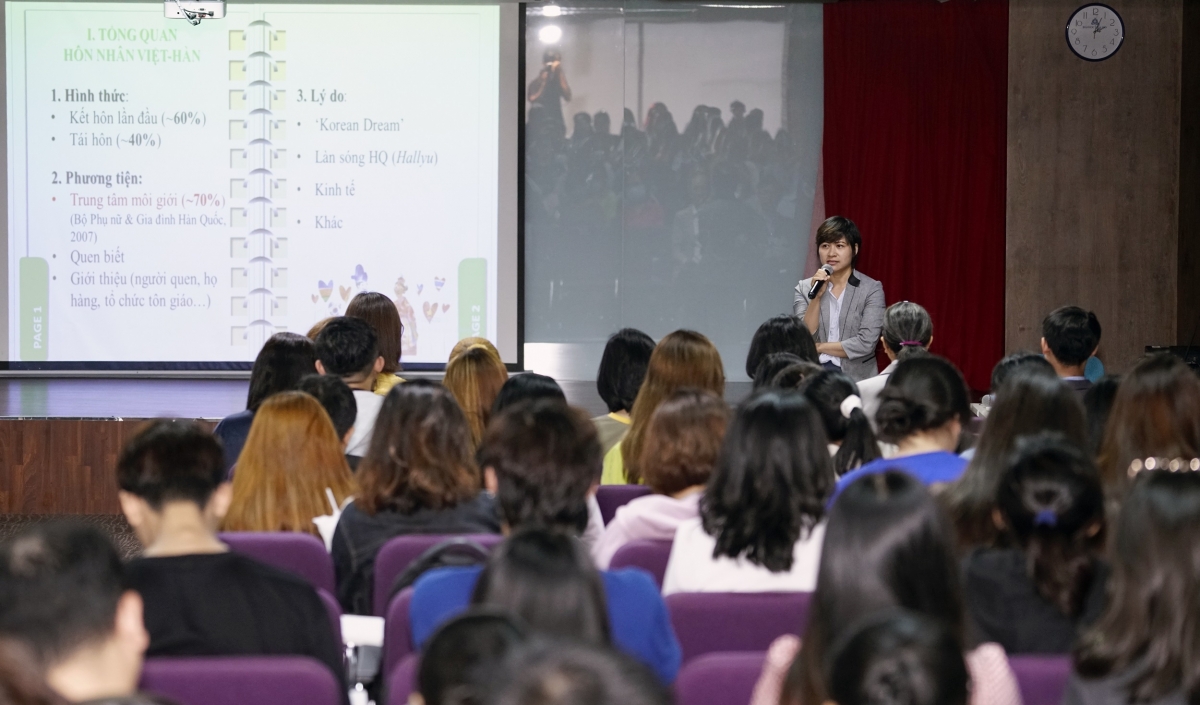
Dr. Nguyen Thi Phuong Thao shares with students about the situation of Vietnamese – Korean marriage.
First of all, Ms. Thao presented statistics from the Korean Statistics Agency (KOSTAT) on the situation of international marriage in general and Vietnamese – Korean marriage in particular. According to KOSTAT, in 2020, there were 23,643 international marriages in Korea, of which the rate of marriages between Korean husbands and foreign wives accounted for 74.8%. It is worth noting that nearly 80% of these couples have husbands older than their wives (42% have husbands 10 years older). Regarding Vietnamese-Korean marriage specifically, about 60% of couples are getting married for the first time and 70% are getting married through a brokerage center.
Next, Ms. Thao presented three main reasons Vietnamese women marry Korean men including: “Korean Dream”, Korean trend (Hallyu) and economic reasons. The rate of marriage between Vietnamese wives and Korean husbands accounts for nearly 40% of the total number of international marriages in Korea and the number of Vietnamese brides reached 44,172 people – the highest among foreign brides in Korea in 2019. According to research. , the average age difference between Korean husband and Vietnamese wife couples is 16 years old. However, the divorce rate of Korean – Vietnamese families is also the second highest, after Korean – Chinese couples. The two biggest reasons why these couples divorce are husband violence, and differences in lifestyle, views, and thoughts.
Korea is one of the very few countries in the world that calls internationally married families “multicultural families” and children born into these families are called “multicultural children”. . Most of these children do not want and are not encouraged to learn their mother tongue and have a high dropout rate due to poor relationships with friends and teachers or not being able to keep up with class content.
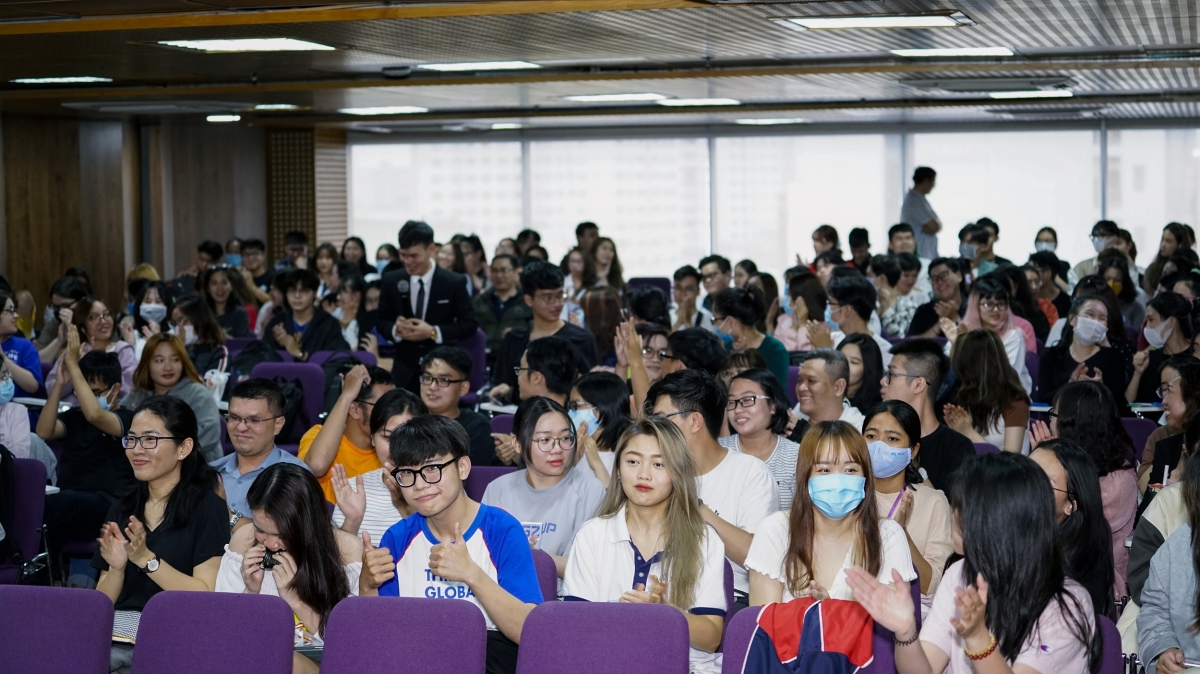
Next, Ms. Thao highlighted the social status of Korean women in feudal and modern times with typical statistics on gender equality. Korea is a country deeply influenced by Confucian ideology. Feudal law strictly regulates remarriage as well as family “rules” for Korean women, including 7 things that if the wife violates, her husband will kick her out of the house or divorce her. legally (“disappeared”). The seven things include: (1) not having a son; (2) disobeying and taking care of her husband’s parents; (3) talkative; (4) jealousy; (5) lasciviousness; (6) evil; (7) theft.
Modern Korean women are somewhat liberated from Confucian ideas, but they bear the “dual role burden” or have to take on many roles in life. Many Korean women tend not to get married or have children because gender inequality in Korea is still very high. In terms of salary, Korea has the largest gender salary gap among developed countries. The rate of female leaders is only 2.1%.
In the final part, Ms. Thao explained the position of Vietnamese brides in Korea as a “minority group” with countless difficulties and challenges related to language barriers and differences. culture, discrimination, economics, parenting and family conflict. However, Ms. Thao also introduced some successful cases of Vietnamese brides in Korea thanks to the brides’ own strength and the active support of the Korean Government.
Moving on to the second topic: “Vietnamese Bride in Taiwan” presented by M.A. Nguyen Thi Ngan Hoai. Ms. Hoai focused on sharing about “The general situation of gender equality in Taiwan, the reasons why women marry Taiwanese men, and the advantages and disadvantages of Vietnamese brides in Taiwan.”
Regarding the general situation of gender equality in Taiwan, Ms. Hoai said that Taiwan is a country that makes great efforts to promote women’s rights and gender equality and is one of the leading countries in Asia in gender equality. Specifically, in 2016, Taiwan had its first female president, Ms. Tsai Ing-wen. The proportion of female legislators is 38%, compared to 22% internationally. Taiwan’s Gender Inequality Index (GII) in 2017 ranked 8th and in 2019 ranked 6th.
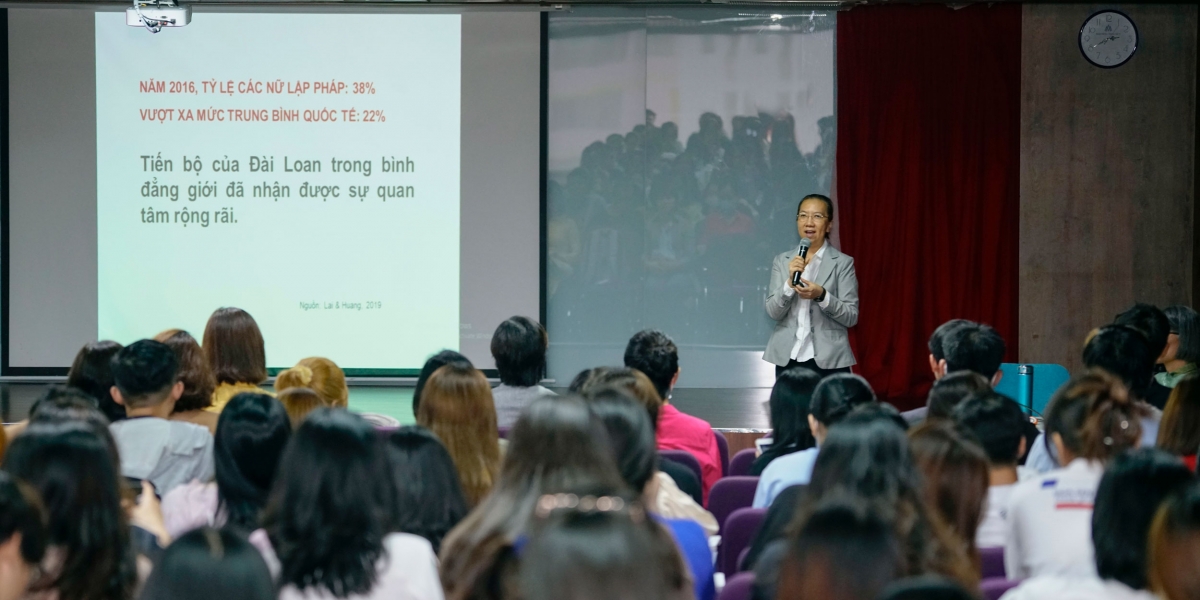
MSc Nguyen Thi Ngan Hoai presented on the topic Vietnamese Brides in Taiwan.
Next is the reason why women marry Taiwanese men. Ms. Hoai shared that the wave of foreign girls marrying Taiwanese people started in 1990 and more and more Southeast Asian women are marrying Taiwanese men. According to research, some of the main causes for this phenomenon are:
- Social stratification is increasing,
- Some men in Taiwan do not find it easy to find a partner,
- The development of marriage brokerage companies;
- The rise of feminism in Taiwan over marriage;
- The increase in second marriages aims to solve difficulties in marriage and family continuity; and
- Southeast Asian women want to escape poverty and expand their horizons, so they marry Taiwanese men.
Some studies by Tran, Nguyen & Tran in 2013 showed that the motives of Vietnamese brides marrying Taiwanese men include: Wanting to help their family (46.7%), wanting better living conditions (26.7%), love her husband (17.8%), and want to change her life (8.8%).
According to a 2015 survey, in general, Vietnamese women have left good impressions on Taiwanese people such as: gentle, studious, loyal, responsible, and hardworking.
According to research by Mai Kim Thanh in 2015, Vietnamese women who marry Taiwanese men have characteristics such as being young, having a low level of education, living in rural areas, working as unskilled workers, and having very low wages. As for Taiwanese men who marry Vietnamese women, they have characteristics such as: high age, low education level, most of them live in rural areas, unskilled workers, unstable economic situation, often poor health status, and There are people with disabilities. The characteristics of this potential husband are often not disclosed by the brokers, but they often paint a scenario of wealth, luxury, happiness, and leisure for Vietnamese brides.
The forms of marriage between Vietnamese and Taiwanese wives are also very diverse, including: through brokers, matchmakers, to study, to work, or to do business… Particularly, marriage through brokers has many risks because the woman no information about the Taiwanese husband.
In addition, the audience heard about the difficulties that new Southeast Asian immigrants, specifically Vietnamese brides, often encounter when marrying Taiwanese men from the studies of Taiwanese scholars such as: Cai (2000), Liu (2001), Wang (2001), Xia (2002), and Ding (2007):
- Regarding cultural, language, and communication disagreements, Vietnamese brides often do not have enough language skills, so there are disagreements in communication. At the same time, when they first come to Taiwan, they often stay at home for a long time and have poor language communication, so misunderstandings and disagreements easily arise with their husband’s family members. In addition, different educational backgrounds, cultures, and values lead to different behaviors, thoughts, perceptions, attitudes, lifestyles, and daily behaviors that are not easy to integrate. Therefore, difficulties will pile up and create tension for the parties (Zheng, 2000; He, 2003; Ding, 2007).
- Regarding discrimination in the media, the patriarchal or superior ideology of Taiwanese society is reflected in news reports about new immigrants that are often negative such as: commercial marriage, divorce, fake marriage, prostitution, or The purpose of marriage is to deceive and take advantage. Due to lack of understanding and being infected by false information, Taiwanese people often seem to have prejudice against new immigrants, specifically Vietnamese brides. Taiwanese society also relies on economics and money to evaluate people from different countries. For example, they use discriminatory terms for Vietnamese brides because they come from developing countries, but they use different terms for brides from powerful countries like Japan and the United States. Of course, based on the economic power of where women come from, they are treated very differently (Liu, 2001; Ding, 2007).
- Regarding the dual adaptation of immigration and marriage, immigration is not just a change of residence but also a process of adjusting social, cultural and environmental norms continuously and that immigrants face and adapt to different challenges. New immigrants not only enter Taiwanese society but also join new families. Therefore, they really need guidance and support not only from the husband, the husband’s family, organizations, the whole society, policies and laws to become adaptive and quickly integrated citizens.
Finally, Ms. Hoai presented the advantages of Vietnamese brides in Taiwan. The rights of New Immigrants in Taiwan are increasingly being paid attention to in many areas of life thanks to the feminist movement, gender equality and especially the Taiwanese government’s concern for future generations of children. of New Immigrants. For example, in terms of health: New Immigrants receive a prenatal health check allowance; receive subsidies or loans to support starting a business when encountering difficult circumstances such as the husband’s disappearance, imprisonment, death, malicious abandonment by the husband or divorce due to abuse, domestic violence, and no Can work and must raise children under 18 years old alone.
There are many typical examples of Vietnamese brides highlighted by the media because they have made efforts to integrate into society and contributed a lot to Taiwan. They are Advisors to the President on issues related to New Immigrants, officials of the Ministry of Immigration, professors, and Vietnamese teachers at primary schools; is a trailer truck driver; is a devoted wife who sacrifices and dedicates herself to Taiwan.
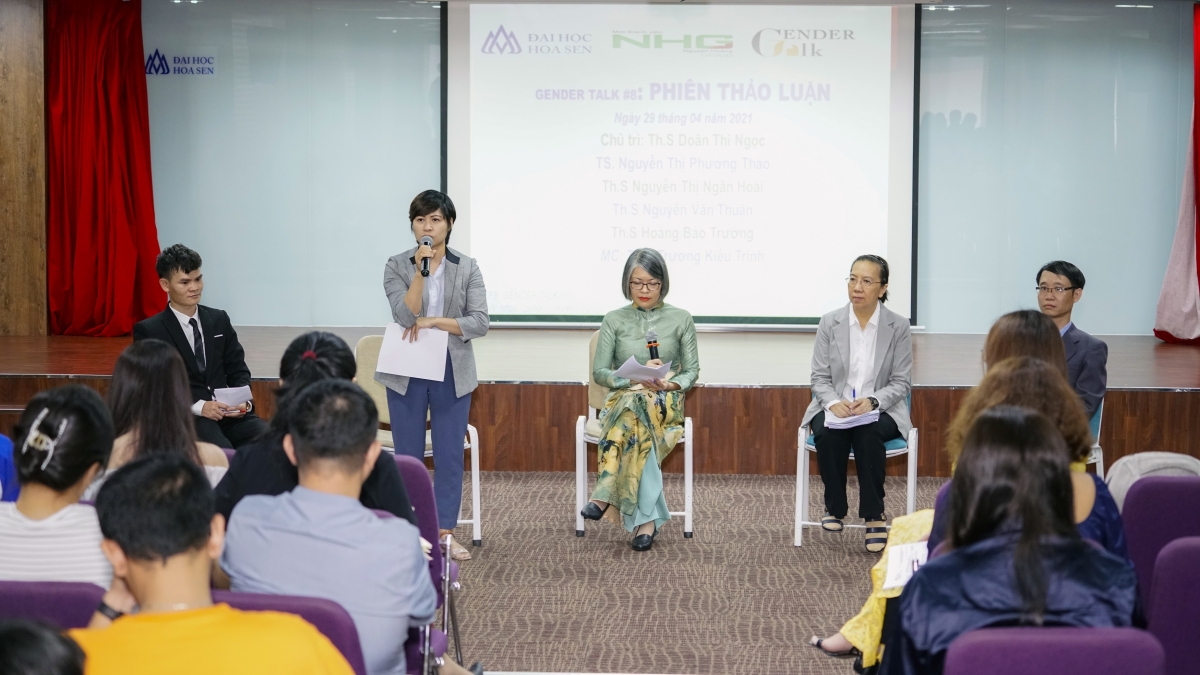
GENDER TALK DISCUSSION SESSION #8
The discussion between the audience and the final guests of Gender Talk #8 was very “hot” and very exciting. The Organizing Committee received 35 questions from the audience. During a limited time, guests and audiences focused on discussing everyone’s right to pursue happiness and the freedom to choose who they love, and the unequal relationship between Vietnamese couples. and abroad in general.
In fact, women in developing countries will face disapproval, be despised, and be judged maliciously due to unequal marriage relationships due to the level of socio-economic development between the two countries. equal, because personal and family rights and money are not equal, because education on both sides is not equal. Therefore, Vietnamese brides are often (but not all) vulnerable to having their dignity violated, being advertised as products, often being dependent, disadvantaged, and having women’s and human rights violated. blatant ways such as “disguised trading in marriage, husband buying wife, sugar daddy and sugar baby relationship or buying wife to do cheap housework and as a sexual tool”.
Guests and audiences all dared to look straight at the truth even though it was very painful and everyone in the audience agreed that everyone has the legitimate right and desire to love and marry anyone if they love each other regardless. religion, race, country, etc. Everyone left with many concerns about gender equality, the role of men and women in love, about family, about multiculturalism, and about Vietnamese brides in the country. outside. Many audiences want to hear more about topics about Vietnamese brides in Western countries.
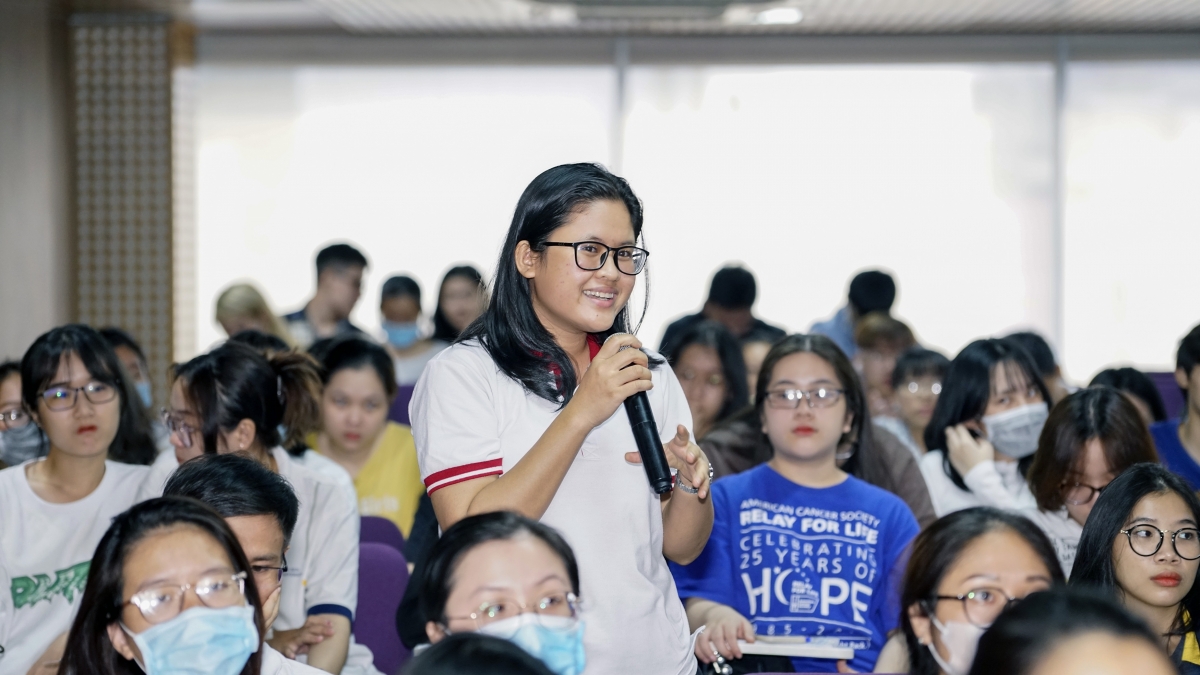
AUDIENCE’S FEELINGS ABOUT GENDER TALK #8
#1 Bui Van Thang: Through Gender Talk #8, I have had a lot of experiences and feelings about socio-cultural knowledge to enrich my understanding of gender and gender equality. The difficulties that Vietnamese brides in Korea have to go through are language barriers and cultural differences, prejudice and discrimination. I’m impressed that there are Vietnamese brides in Taiwan who can drive big trucks, breaking traditional gender roles. I have feelings of anger and indignation towards human trafficking rings masquerading as marriage brokers, from setting a price for each bride, which is a form of objectification and commercialization of women. Women are considered commodities.
In addition, these brokerage companies also hang goats’ heads to sell dog meat by giving false information about the groom, leading to difficult situations for brides, in the light of which, they marry husbands who do manual labor, and in the worst cases, they marry husbands who do manual labor. Then they marry sick husbands, and worse, they may be considered by their husband’s family as sex slaves serving the animalistic desires of the men in the family. I have never seen a woman’s value become so cheap. Many women, even my parents, think short-sightedly that marrying a foreigner will change their lives.
The dream of marrying a foreigner and freely changing their lives is not wrong, but cheating and disguising have indirectly pushed their children into the depths of despair. Thereby, we should reconsider not only Vietnamese brides abroad but also in some marriages in Vietnam, the value of women is still not respected, they are also abused, they are also sexually harassed, they are also restrained and tortured by old customs. We, especially men, need to reflect on ourselves, we are an important factor in helping women regain their value.
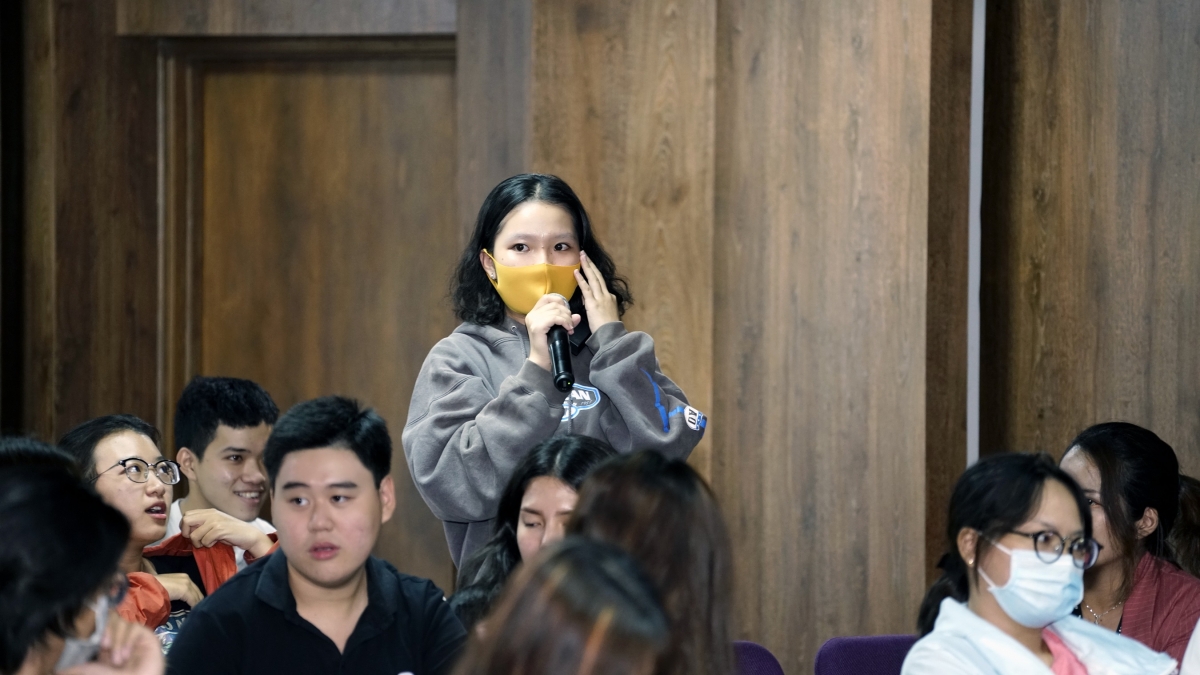
#2 Lam Thanh Thao: I felt that the participation in GENDER TALK#8: “Vietnamese brides in Korea and Taiwan” was very good and left me with many emotions. Vietnamese girls who go there are mostly brokers. I feel sympathy for the plight of gentle country girls who do not have enough knowledge or awareness about protecting themselves, and accept the sacrifice of marrying a foreign man so that their parents at home can have money to change their lives. live better. When going there, the girls encountered countless difficulties because they did not know the language, the new cultural environment, not to mention having to endure many humiliations and violence from their husband’s family, living an extremely miserable life. Just this alone makes me feel angry. I’m also a girl, but I go to university to expand my knowledge, communicate with people around me, and I’m even happier when I study Gender and Development from Ms. Doan Thi Ngoc. . I hope that girls in rural or urban areas must be equipped with knowledge about human rights, women’s rights, and respect for themselves because today Vietnamese women are independent, equal, and no longer A slave to money and sex. I also hope that Ms. Ngoc and the school will create opportunities for me and other students to attend upcoming useful workshops so that we can have more profound lessons and a more realistic view of equality. men and women today.
#3 Thach Thi Kim Ngan: I am very happy to participate in Gender Talk #8 and meet Dr. Nguyen Thi Phuong Thao, Master Nguyen Thi Ngan Hoai, Mr. Hoang Bao Truong Anh, Mr. Nguyen Van Thuan, and Ms. Doan Thi Gem. Thank you teachers for giving us very honest knowledge and insight into the lives of brides in Korea and Taiwan. We often think that marrying a foreign husband will make our lives more prosperous and happier, but the reality is very different. What is marriage? Marriage is proof that the love of two people is truly ready to be together for life. How lucky are those who marry foreign husbands and are loved by them. But marriages that do not come from true love are unfortunate. Very sorry for the difficult families, life pushes Vietnamese girls on a path where they do not know what tomorrow will be like, happy or miserable. As a woman, I have the opportunity to go to school to improve my knowledge, and am fortunate to be able to study the subject “Gender and Development” by Ms. Ngoc, so now I want all women to be strong and understand their rights. choose love and the right to live your own life. Take control of your fate, don’t depend on it.
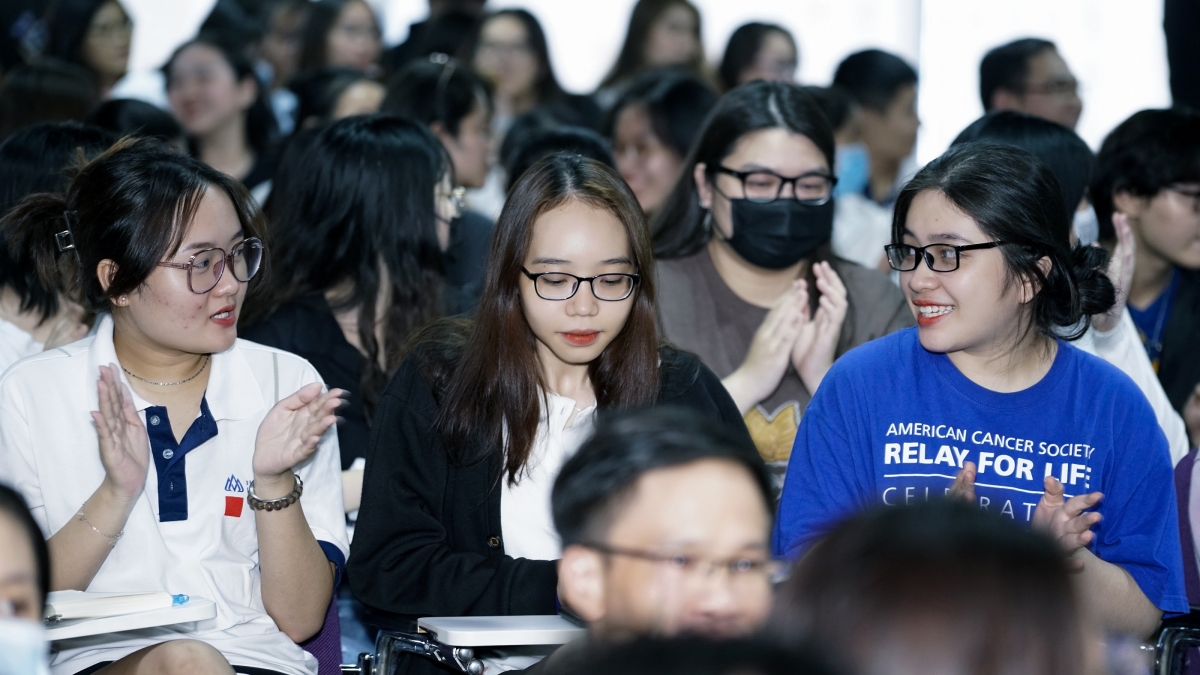
#4 Nguyen Do Van Thu: This is the first time I have attended a Gender Talk #8 session at Hoa Sen University. The hall was really crowded with an audience, the atmosphere was extremely exciting and I also joined in the excitement with everyone to hear sharing about the topic of Vietnamese Brides in Korea and Taiwan. I learned that most of these foreign marriages are through brokers, where it is easy to give false information that makes Vietnamese girls mistakenly think about their future husbands. They did not have thorough preparation but simply wanted to realize the Korean dream, the desire to live in a rich, beautiful, civilized country and be financially and economically stable. to help support his family in Vietnam. The large age difference between Vietnamese and Korean husbands has led to differences in personality, outlook on life, and is also the cause of domestic violence and ultimately divorce. in a society plagued by stigma and discrimination.
The general discussion session of Gender Talk #8 also brought me a lot of useful information. I listened to diverse and profound opinions from experts as well as my peers about the roles and positions of women and men; How to encourage more respect and equality for women. In this part, I was most impressed with Ms. Ngoc’s shares. She often surprised everyone by openly telling stories and she taught us that women must be highly educated and independent. finances and know how to use tears at the right time and right place! Gender equality is encapsulated in eight words: equality in responsibilities, rights, positions and roles. I have been inspired to strive harder, assert my position, and constantly express my views, support and appreciate every woman who stands up to exercise her rights and pursue her passion.
#5 Trinh Thi Tuyet Thom: From my perspective, gender equality is an issue that has always been given special priority by the Party and State and Vietnam has brought many great achievements recognized by the international community. recognized and appreciated. As Gender Talk #8 “The position of Vietnamese Brides in Korea and Taiwan” shows, the relationship between Vietnam – Korea and Vietnam – Taiwan is becoming increasingly close and the number of Vietnamese women marrying Korean and Taiwanese couples are increasing rapidly. Many Vietnamese women have married Korean and Taiwanese men, bringing with them dreams and desires to change their lives and change the fate of themselves and their families. But they encounter countless difficulties, from language barriers, cultural barriers, discrimination, economic barriers, child care and education, to family conflicts with their husband’s family. On the other hand, there are also people who, thanks to their will and determination, have developed well. I am very frustrated when there are brokerage centers that provide false information about the husband and life in a foreign land to deceive Vietnamese brides. After participating in Gender Talk #8, I feel the need to promote gender equality and empower women is the goal of all humanity, including Vietnam. Thank you Organizing Committee!
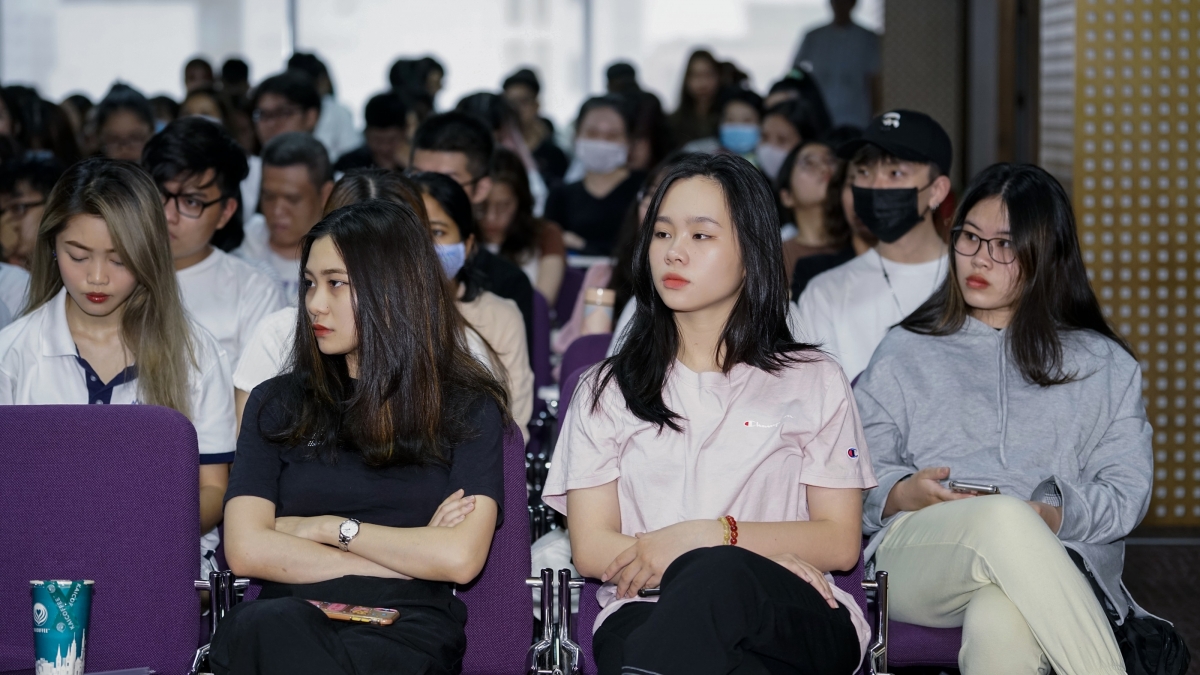
#6 Nguyen Thi Anh Duong: Gender Talk#8 for me is not only a workshop of lecturers and speakers to share information about the common rate of Vietnamese brides marrying Korean-Taiwanese men, but Coming here, I feel very clearly the true events and stories of today. For example, young Vietnamese girls often dream of marrying a Korean man because they often see on TV and movies that life there is very beautiful, romantic and rosy. But the reality is very different from what we see. The number of Vietnamese brides marrying Korean men is the highest, so brokerage companies for marriage between Vietnamese and Korean people are developing strongly. When that company introduces you, they will show you the best of Korea like you see in movies. But you don’t know, according to Korean brides, when they got to the airport on the way home, they only saw countryside scenes full of trees and very different from what was introduced. But because it’s too late, part of them also wants to change their lives and the Vietnamese bride’s parents also think they will have a better life so they just try.
Living in Korea is not as easy as you think. If others know that you are a foreigner and do not know how to speak Korean, you will be despised and looked down upon. So most Vietnamese mothers who give birth in Korea usually will not teach their children Vietnamese, because if people or the child’s friends know that they are foreign, they will be discriminated against immediately. But currently, Korea has many preferential policies for foreign brides. When getting married, don’t make a hasty decision, but research carefully so that you can look back and not regret your beautiful life.
The workshop was very lively, especially Ms. Doan Thi Ngoc also participated in the conversation, making the atmosphere more interesting. When it came to the student question section, Hoa Sen students were very active and had very good and meaningful questions. Give teachers the opportunity to pass on their experiences to us. Thank you Hoa Sen University for allowing me to participate in Gender Talk #8 so meaningfully!
#7 Nguyen Xuan Trinh: Gender Talk #8 made me feel very happy because the way the teachers shared was very witty and rich in simulation, making everyone in the audience laugh. The knowledge the teachers share is very good combined with witty ways of talking, so I listen to the knowledge the teachers say and especially absorb it very quickly and understand the problem. The knowledge the teachers shared was not just limited to the topic name “Vietnamese-Korean Bride”, the teachers shared more about feminism and their experiences to give all students the opportunity to Learn how to be a bride or work anywhere.
#8 Nguyen Thu Thao: I am very happy to participate in Gender Talk #8 because the teachers bring a very funny feeling to the students. I also know about the issue of Vietnamese brides in Korea and when I came to Gender Talk #8, I learned more thoroughly and heard more about the current situation. In my opinion, after coming to the conclusion that Korea is just a place to travel, not a place worth living. At the end of the session, I felt grateful to the teachers for standing up to protect Vietnamese brides in this situation.
#9 Phuong Tu Thanh: My feeling from Gender Talk #8 is that it was very useful, exciting, fun, and unforgettable. They explained to me the knowledge and current situation of the injustices and suffering that Vietnamese brides have had to endure. Teachers have shown us how to stand up to protect and fight for women’s rights, helping everyone better understand gender equality. There are also good sides in Korea and in Taiwan. I look forward to Gender Talk #9 and thank the teachers for bringing a successful discussion.
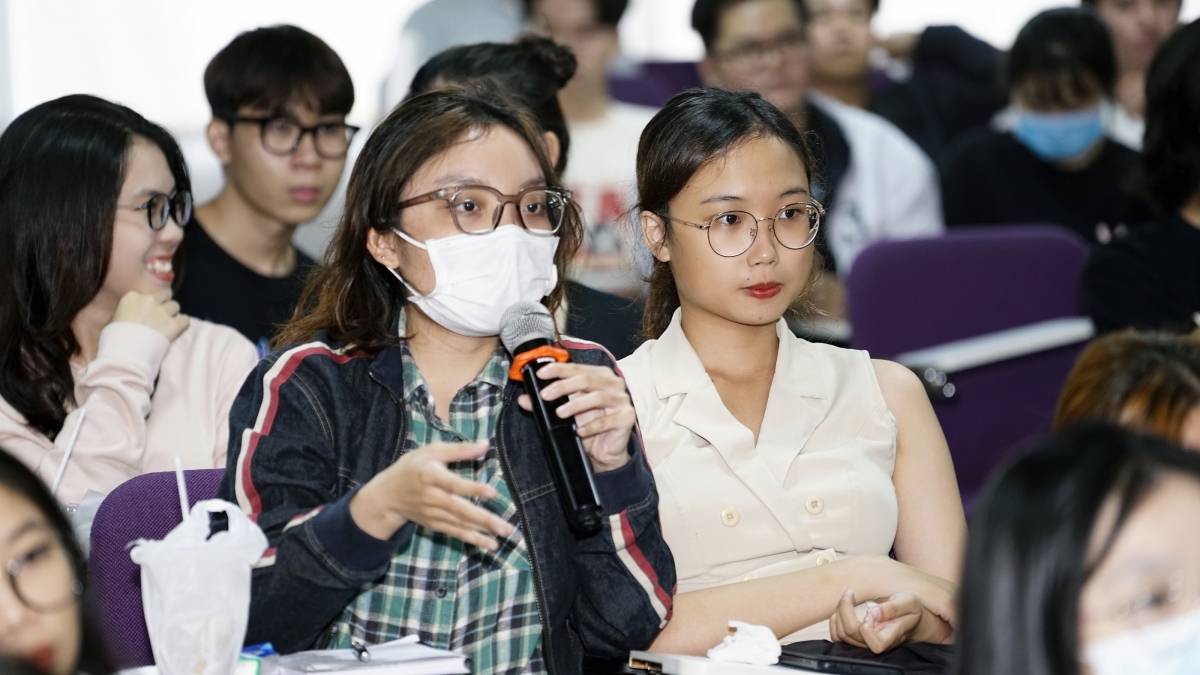
#10 Le Thi Mong Quynh: Luckily, I got to know and connect with Ms. Doan Thi Ngoc through an event on “Promoting Gender Equality in Vietnam” at Fulbright University. I was very impressed by Ms. Ngoc’s engaging presentation, containing a lot of valuable and novel information conveyed concisely and easily to understand, along with practical examples that were subtly and humorously integrated at that event. Today, coming to Gender Talk #8, the first thing that impressed me was the “heat” in the auditorium because the audience was very large. The speaker on the topic is super good with great education and a lot of practical experience. The life of Vietnamese brides in Korea and Taiwan is portrayed very realistically through research, stories, images, etc. presented in detail by the speaker.
Before coming to Gender Talk #8, I read and learned about the lives of Vietnamese brides in these two countries on newspapers, social networking sites, etc. There is pink, there is black. But in Gender Talk #8, I grasped basic information about the brides’ position, had a more multi-dimensional and general view of their lives in foreign lands from objective, unbiased perspectives. taste and do not blame.
The special thing about Gender Talk #8 that I feel is that I feel even more sorry for the fate of Vietnamese brides who are abused and exploited. The more the audience understands the importance of Gender Equality, the stronger their desire to be independent and take control of their lives. This was shown through continuous applause when Ms. Ngoc emphasized, “Women today must be highly qualified, financially independent, emotionally independent, and know how to use tears at the right time and place. right person”.
After Gender Talk #8, I still feel bitter when imagining the scenario of Vietnamese brides being sold, chosen by others as “commodities” to take as “wives”. I am still wondering and thinking about the questions: How can Vietnamese women become respected foreign brides, not because they are deceived, because they help their families pay off debt, because they desire a safe life? idle, dependent, dependent, and discriminated against. Why are there Vietnamese brides who are very miserable but still do not want to return to Vietnam because they think that abroad is still better than in Vietnam? I have seen people with high academic degrees, both men and women, still discriminate and have gender stereotypes. What do we need to do to contribute to promoting gender equality in a strategic and effective way? We hope that Gender Talk will take place more often and expand knowledge about Gender and Gender Equality to people from all walks of life. Thank you Organizing Committee!
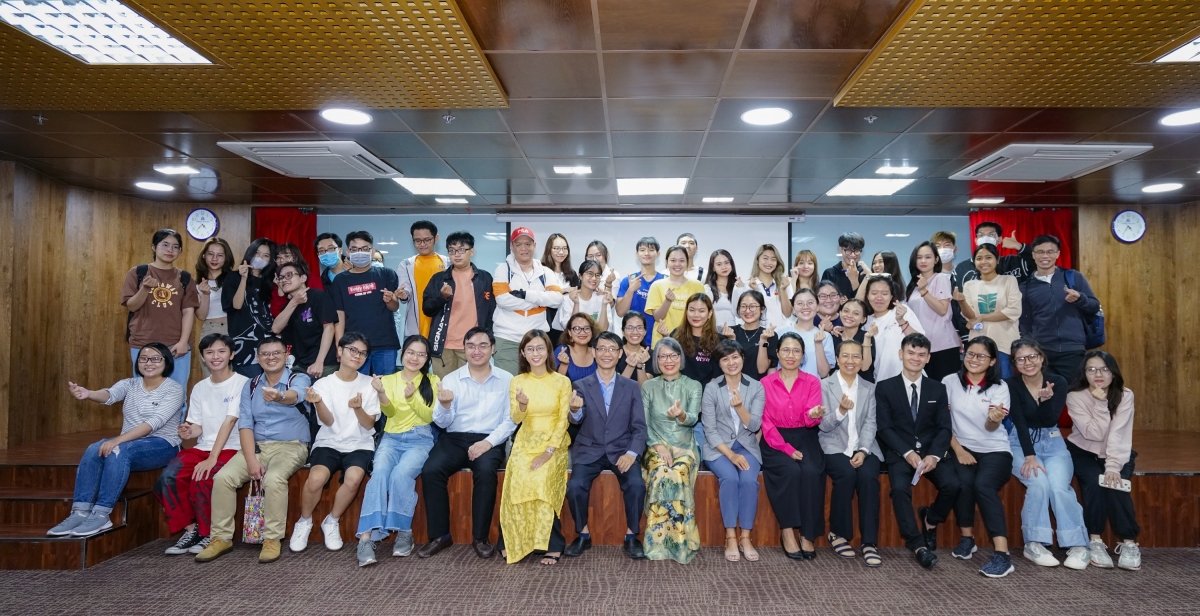
#11 Nguyen Thu Hang believes that being a Vietnamese marrying a foreigner will more or less encounter objections and prejudices. This cannot be avoided, because this is the consequence of the “previous marriage brokerage” left behind. However, I have come into contact with positive Vietnamese brides. Even though they are misunderstood or despised, they always try to find every opportunity to learn and assert themselves. “In Taiwan, there are many free classes for new immigrants, such as: free Chinese classes, makeup classes,… there are even classes from elementary school up, creating conditions for women to go abroad. study and have the opportunity to go to university. The process of learning and interacting with new people and new environments will help Vietnamese brides understand better information, be proactive in work and finances, and promote their own good points…”. After a Gender talk session took place and this made me realize that the problems that are happening to Vietnamese brides when marrying Korean men are extremely difficult because the woman has to suffer so many losses.
#12 Dang Hoang Phuong Trinh: Gender Talk topic #8:Dr. Nguyen Thi Phuong Thao and MSc Nguyen Thi Ngan Hoai also presented the reason why they chose to marry foreign husbands. Some people are forced to do so because of their family and circumstances. Besides, there are difficulties, obstacles, and barriers for brides, and each country’s government has also introduced a number of measures to protect the rights of Vietnamese brides. Gender Talk #8 does not stop there but also expands to the issue of gender prejudice and gender equality not only in Vietnam in particular but in the world in general. After that discussion session that day, I gained a lot of new knowledge. I learned that gender equality is not just about demanding women’s rights or putting men down, but that everyone benefits. And not only do women suffer from many social prejudices, but even men, when they have to shoulder more responsibilities imposed by society, put a lot of pressure on them. And one last thing is that people ask what should Vietnamese men do when women prefer to marry foreign men? The question received a lot of responses and people were even more excited. This was truly an interesting workshop and gave me a lot of knowledge that I wanted. Thank you Organizing Committee!
Doan Thi Ngoc, Nguyen Thi Phuong Thao and Nguyen Thi Ngan Hoai

